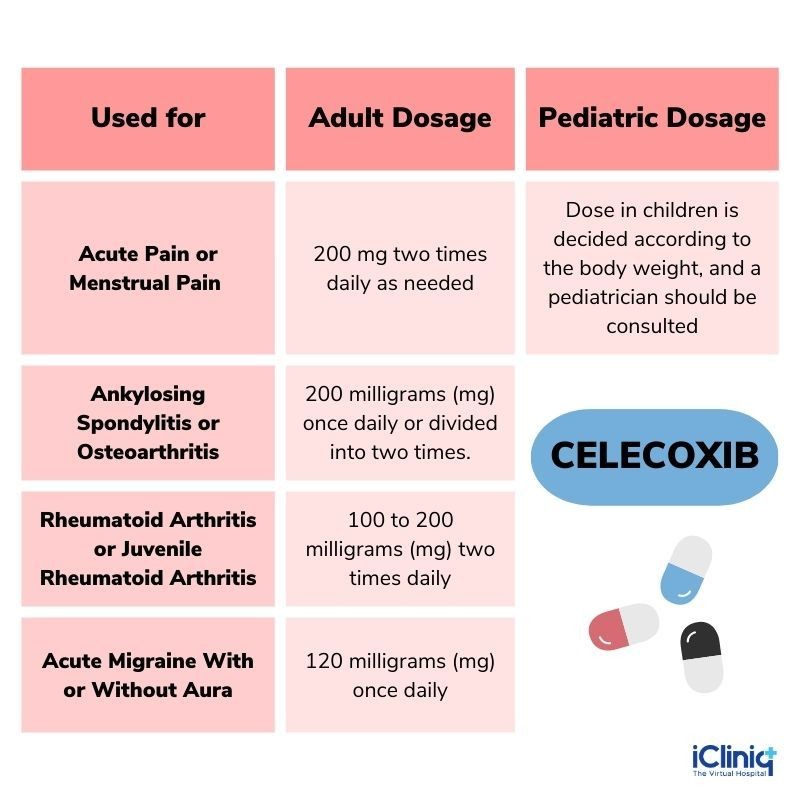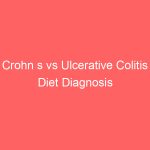
Contents
Celecoxib (Celebrex)
Prostaglandins are important contributors to the inflammation of arthritis, causing pain, fever, swelling, and tenderness. Celecoxib blocks the enzyme that makes prostaglandins, resulting in lower concentrations. This reduces inflammation, pain, fever, swelling, and tenderness. Celecoxib causes less inflammation and ulceration of the stomach and intestine and does not interfere with blood clotting.
NSAIDs prevent the formation and reduce the size of polyps in patients with familial adenomatous polyposis (FAP), a genetic disease. FAP causes the development of large numbers of polyps in the colon, which often become malignant.
FAP can only be cured by removing the entire colon. Celecoxib is approved as an adjunctive treatment for FAP. Celecoxib also reduces cramping and pain during menstrual periods by blocking the production of prostaglandins.
Celecoxib uses and conditions it treats
- Celecoxib relieves pain, fever, swelling, and tenderness caused by osteoarthritis, juvenile arthritis, rheumatoid arthritis, and ankylosing spondylitis.
- Celecoxib alleviates symptoms and signs of arthritis, but does not prevent disease progression.
- Celecoxib is approved for patients with familial FAP who have not had their colons removed.
- Celebrex is also used to relieve acute pain and menstrual cramps.
What are the side effects of celecoxib?
RISK OF SERIOUS CARDIOVASCULAR AND GASTROINTESTINAL EVENTS
Cardiovascular Thrombotic Events
- NSAIDs increase the risk of serious cardiovascular thrombotic events, including myocardial infarction and stroke, which can be fatal. This risk may occur early in treatment and may increase with prolonged use.
- Celecoxib is contraindicated in patients undergoing coronary artery bypass graft (CABG) surgery.
Gastrointestinal Bleeding, Ulceration, and Perforation
- NSAIDs increase the risk of serious gastrointestinal (GI) adverse events, including bleeding, ulceration, and perforation of the stomach or intestines, which can be fatal. These events can occur at any time during use and without warning symptoms. Elderly patients and patients with a history of peptic ulcer disease and/or GI bleeding are at greater risk.
Common side effects of celecoxib include:
More serious side effects of celecoxib include:
- Fainting
- Vomiting
- Kidney failure
- Heart failure
- Aggravation of hypertension
- Chest pain
- Ringing in the ears
- Deafness
- Stomach and intestinal ulcers
- Bleeding
- Blurred vision
- Anxiety
- Photosensitivity
- Weight gain
- Water retention
- Flu-like symptoms
- Fever
- Cough
- GERD (gastrointestinal reflux disease)
- Rash
- Drowsiness
- Weakness
Other adverse reactions
Celecoxib, like other NSAIDs, may cause serious stomach and intestinal ulcers at any time during treatment. Celecoxib does not interfere with blood clotting like other NSAIDs.
Celecoxib can cause allergic reactions in individuals who have developed such reactions from sulfonamides, aspirin, or other NSAIDs. These individuals should not take celecoxib.
NSAIDs (except for low-dose aspirin) may increase the risk of heart attacks, stroke, and related conditions, which can be fatal. NSAIDs should not be used for pain resulting from CABG surgery.
NSAIDs increase the risk of serious stomach and intestinal adverse reactions such as bleeding, ulcers, and perforation. These events can occur at any time during treatment and without warning symptoms. Elderly patients are at greater risk.
QUESTION
What is the dosage for celecoxib?
Use the lowest effective dose for each patient.
- For osteoarthritis, the usual dose is 100 mg twice daily or 200 mg as a single dose.
- For rheumatoid arthritis, the usual dose is 200 mg twice daily.
- For acute pain or menstrual cramps, the initial dose is 400 mg as a single dose, followed by an additional 200 mg if necessary, then 200 mg twice daily as needed.
- For FAP, the recommended dose is 400 mg twice daily.
What drugs interact with celecoxib?
- Concomitant use of celecoxib with aspirin or other NSAIDs may increase the occurrence of stomach and intestinal ulcers. It may be used with low-dose aspirin.
- Fluconazole increases the concentration of celecoxib in the body. Treatment with celecoxib should start at the lowest recommended doses in patients taking fluconazole.
- Celecoxib increases the concentration of lithium in the blood and may promote lithium toxicity. Lithium therapy should be closely monitored during and after celecoxib therapy.
- Persons taking the anticoagulant warfarin should have their blood tested when starting or changing celecoxib treatment.
- NSAIDs may reduce the blood pressure-lowering effects of drugs given to reduce blood pressure.
- Persons who drink more than three alcoholic beverages per day may be at increased risk of developing stomach ulcers when taking NSAIDs, including celecoxib.
Is celecoxib safe during pregnancy or breastfeeding?
- Celecoxib has not been studied in pregnant women. In animal studies, doses twice the maximum recommended dose were harmful to the fetus.
- Celecoxib should not be used in late pregnancy as it may cause heart defects in the newborn.
- Celecoxib should only be used in pregnant women when the benefits outweigh the potential risk to the fetus.
- Celecoxib is secreted in breast milk.
- Nursing mothers should avoid celecoxib or discontinue breastfeeding.
Summary
Celecoxib is an NSAID used to treat pain, arthritis pain, menstrual cramps, and colonic polyps. It alleviates pain, fever, swelling, and tenderness caused by osteoarthritis, juvenile arthritis, rheumatoid arthritis, and ankylosing spondylitis. Adverse reactions include heart attack, stroke, bleeding, ulceration, and perforation of the stomach or intestines, which can be fatal. Serious side effects include fainting, vomiting, kidney failure, heart failure, aggravation of hypertension, and others.


